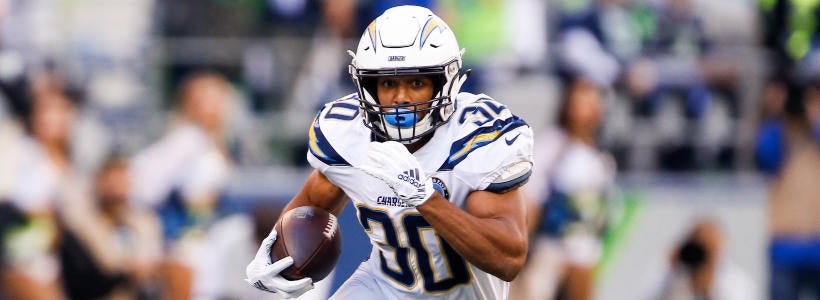Fantasy outlook for the Chargers in the post-Philip Rivers and Melvin Gordon era

The 2020 NFL offseason has been so wild that some storylines have flown completely under the radar. One of said storylines is the complete offensive overhaul in Los Angeles. For the first time since 2003, Philip Rivers will play for a team other than the Chargers. And, for the first time in his six-year career, Melvin Gordon will take handoffs from someone other than Rivers.
Rivers signed a one-year $25 million deal to quarterback the Indianapolis Colts, and SportsLine's simulations now have the Colts projected for nine wins in 2020. Gordon agreed to a two-year deal worth $16 million to join the Denver Broncos, and SportsLine's model projects no improvement to Denver's win total with Gordon on the team.
Without Rivers, the Chargers appear poised to start their season with Tyrod Taylor as the starting quarterback. L.A. will probably address the position in the NFL Draft, but barring an unforeseen trade, Taylor is most likely to start in Week 1. As an entirely different quarterback, stylistically, Taylor's presence will have a ripple effect on the whole offense.
Volume Down
The Chargers have ranked in the top half of the league in pass-to-rush ratio in all but one of the past five seasons -- finishing top-six twice. The only year they weren't in the top half was 2018, when they won 12 games and still ranked 17th in pass-to-rush ratio.
Rivers attempted 591 passes last year, and he's averaged 583 attempts over the past five seasons. If you remove the 12-4 season (Sportsbooks have L.A.'s 2020 win total set at 7.5), he's averaged 601 attempts during that span.
Taylor's career high was 436 attempts in 2016. This offense is going to look a whole lot different if Taylor starts the majority of the games. Most notably, the target volume is going to be significantly lower than what Fantasy owners of Keenan Allen, Hunter Henry, and Mike Williams are accustomed to.
Fewer RB Targets
31.8 percent of Rivers' targets were directed at running backs in 2019. In 2018, L.A.'s RB group accounted for a 27.5 percent target market share. In Taylor's three years as a starter, only 22.3 percent of his targets went to running backs. He didn't have a weapon out of the backfield like Austin Ekeler, but LeSean McCoy was no slouch.
The most likely reason for the lack of RB targets is Taylor's ability to scramble and extend plays with his legs when pressured. There's less need to dump off to a running back for a short gain if able to gain the yards on your own.
Not only will there be fewer overall targets available, but the percentage of those targets that go to the RB group might be smaller too. The fact that Ekeler no longer has to compete with Melvin Gordon for playing time and targets could be enough to make up for the dropoff in total RB targets -- as long as Ekeler sees a larger chunk of the pie, it might not matter that the pie is smaller. But, if L.A. brings in an established back to compete with Ekeler for playing time, it will be difficult to project him for anywhere near his 92 target total from 2019.
Less Accurate Targets
The Chargers pass-catchers are looking at fewer total targets and fewer catchable targets with Taylor under center. Despite having one of his worst seasons in some time, Rivers still delivered what PFF deemed a 'catchable' ball on 76.7 percent of his attempts. For reference, in Taylor's three seasons as a starter for the Bills, his catchable target rate was 71.5, 73.1, and 71.1 percent.
Takeaways
During Taylor's three years as a starter in Buffalo, he supported a total of zero top-24 Fantasy receivers. The only Taylor pass-catcher that came close was Sammy Watkins in 2015. Watkins finished as the WR26, but was the WR16 on a per-game basis.
Taylor started at least 14 games in all three years as a starter and didn't top 20 passing touchdowns in any of them. It wouldn't be fair to put all of the blame on him, though; his group of pass catchers were among the league's worst and struggled with injury each year he was a starter. He'll have a much better chance at success as a passer while starting for the Chargers. But still, there is no way to classify this as anything other than a massive Fantasy downgrade for Keenan Allen, Mike Williams, and Hunter Henry.
With that said, Taylor could be surprisingly useful in Fantasy if he can keep hold of the starting gig. He averaged 6.4 rushing attempts per game as a starter in Buffalo, and as Josh Allen has proven over the past two years, you don't have to be a great real-life quarterback to be a great Fantasy QB if the rushing production is there. Since 2000, 27 QBs have rushed at least six times per game over a 14-plus game season. The average fantasy finish was QB6. 82 percent finished as a top-10 QB and 52 percent finished top-five. It's no guarantee that Taylor continues to rush at that volume in his age-31 season, but the possibility makes him worth a flier in two-QB leagues.
Austin Ekeler's value isn't downgraded by Taylor quite as much as the receivers, but that could change if another competent back is added to the mix. Ekeler has top-10 RB potential in PPR formats as it stands right now, but a lot could change between now and Week 1.

Share This Story


